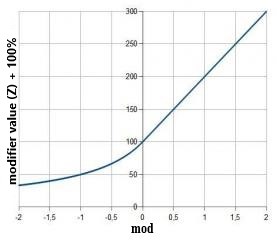Modifier effect addition
Quite often, while improving their own ship pilots are faced with a situation where there is an opportunity to put two items of the same module, but it is not clear how they combine their characteristics and how effective they are going to be in the end.
At the moment, the rules of addition of modules for everything but the damage resistance ones, are the same.
There are two values to which every player should pay attention:
First, the base value. This is a characteristic of your ship that can be improved: from speed to radar range.
The second — the characteristics of the modifier. Modifier is any bonus to improve the base ship parameters: various bonuses, modules, implants.
Some modifiers subtract a certain value (Z%) from the base, and some — add. First modifiers have a negative value, and the second — positive.
Depending on the sign, you must convert their value to the mod parameter, according to the following formulas[1]:
1. IF modifier has a NEGATIVE value, THEN mod = 1 - [ 100% / ( 100% + Z ) ]
2. IF modifier has a POSITIVE value, THEN mod = Z / 100%
Therefore, if you see that a particular module reduces something by 50%, in calculations the real value of the modifier will be -1 and not -0.5: mod = 1 - [ 100% / ( 100% + (-50%) ) ] = -1.
The graph below reflects this:

Then, having recalculated the values of all modifiers, you should add them up and use one of the following formulas:
1. IF MOD < 0 THEN newValue = baseValue / (1 - MOD)
2. IF MOD > 0 THEN newValue = baseValue * (1 + MOD)
MOD — the sum of mod values (Characteristics of module 1 + … + Characteristics of module 3 + implant bonus + ship characteristics bonus);
newValue — total value;
baseValue — the base value of the ship, which can be found in the information about the ship or on Star Conflict wiki.
It is important to understand that the impact of each subsequent modifier changes the total value in a linear fashion, if the modifier sum is positive i.e. for those modifiers that enhance a particular parameter. If the modifier reduces the parameter, its impact will be non-linear.
Example 1
As an example, let’s have a look at Collision Compensators. We have three modules of the same modification, each of which reduces the damage from collisions by 50%. We want to know how the characteristics of the ship are going to change when all three of the compensator will be installed.[2]
Procedure:
- Establish the real value of the parameter: mod = 1 - [ 100% / ( 100% + (-50%) ) ] = -1;
- Add the values of the 3 modifiers: MOD = -1 * 3 = -3;
- Establish the base value, which in this case will be equal to 100% of the damage in a collision;
- Place the value into the formula and do the math: newValue = 100% / ( 1 - (-3) ) = 25%;
- It turns out that installing three Collision Compensators with 50% damage reduction (-50%) will reduce the damage taken to 25% (-75%).
Example 2
The same formulas apply when we need to calculate the effect of implants and bonuses on different active modules of the ship.
For example, let's calculate the effect of the implant Neuroaccelerator "WPN-FS3" (10c), which increases active module parameters by 12%, on the combat module Engine Suppressor 17 version Mk.4, which reduces the target's speed by 53%.
Procedure:
- Establish the real value of the implant parameter: mod = 12% / 100% = 0.12;
- Since the module reduces the target speed by 53%, it refers to a module with a negative parameter value, which can be recalculated using the same formula as mod: baseValue = 1 - [ 100% / ( 100% + (-53%) ) ] = -1.128;
- Place the value into the formula and do the math: newValue = -1.128 * ( 1 + 0.12 ) = -1.263;
- Convert newValue to a percentage value using the inverse formula: 100% / ( 1 - (-1.263) ) - 100% = -56%
- It turns out that installing the 10c implant will increase the slowdown of the engine suppressor to 56%.
Important
In general, this mechanism is similar to the mechanics of damage resistance.
With the current addition of modifier effects degradation is not as strong as improvement.
It is also important that the ‘ceiling’ parameter improvement is much higher than that of their deterioration. Due to the above, it’s impossible to be infinitely lowering characteristics using modifiers with the same penalties.
Notes
- ↑ These formulas apply not only to modifiers, but also to any weapons, active modules, etc. that reduce or increase any parameter percentage during battle, as shown in Example 2.
- ↑ If you install several same modifiers, their effectiveness decreases - up to 90% if you install two and 80% if you install three, we won't take that into account here.